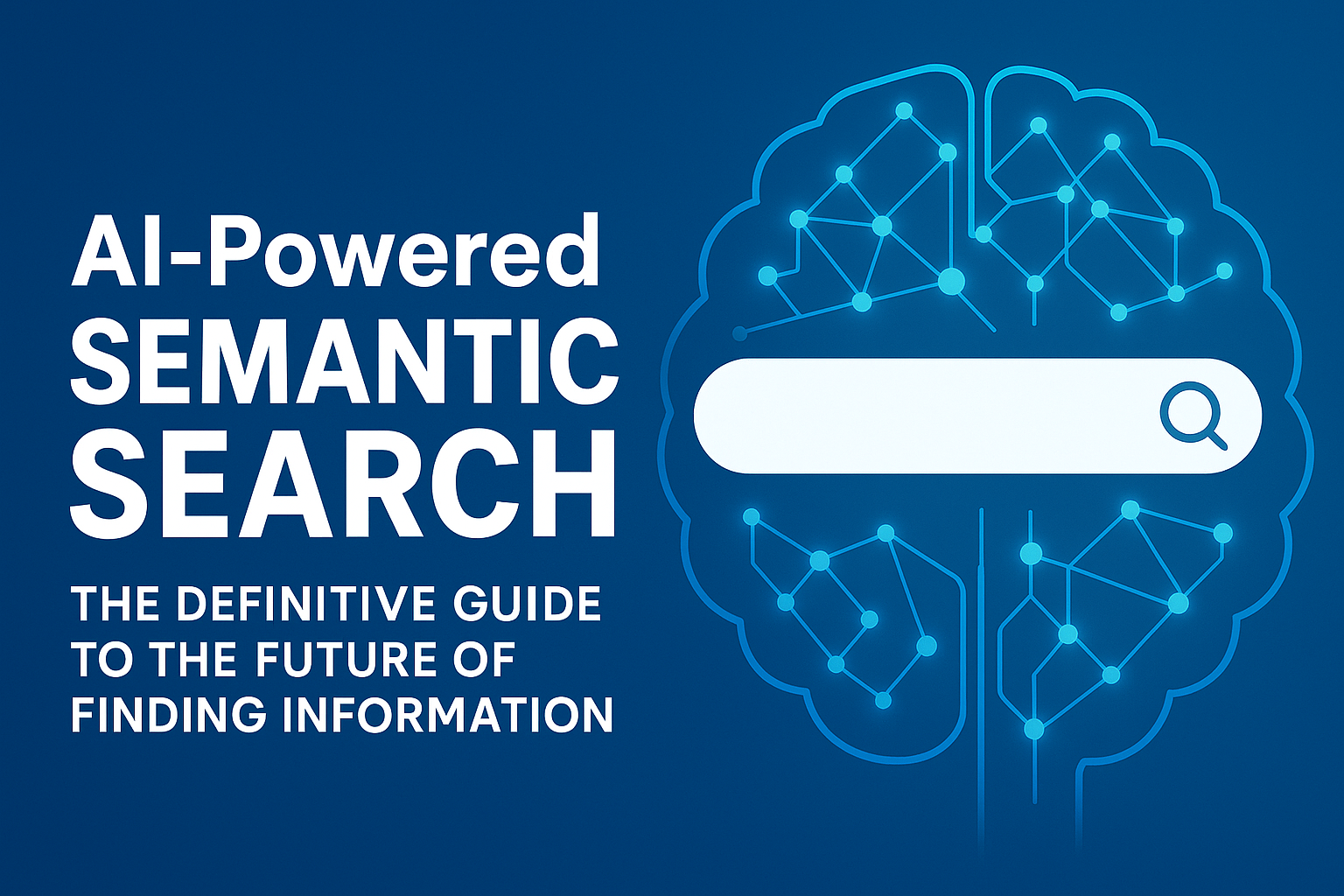The Frustrations of Keyword-Based Search: Why We Need a Smarter Approach
For years, we've relied on keyword-based search, a method that, while foundational, is showing its age. The core problem lies in its literal interpretation of queries. If you search for "best Italian restaurant near me," a traditional engine simply looks for pages containing those exact keywords. This often leads to frustrating results. Websites, eager to rank higher, resort to keyword stuffing, jamming their content with repetitive terms, regardless of relevance. This tactic, while sometimes effective in the past, creates a poor user experience.
Another major limitation is the lack of context. Keyword-based search struggles to understand the intent behind your words. It doesn't differentiate between "apple" the fruit and "Apple" the tech company. This inability to grasp the nuance of language means users are frequently presented with irrelevant results, forcing them to wade through pages that don't actually answer their questions.
This leads to increasing user frustration. In today's fast-paced digital world, people expect immediate and accurate answers. Spending excessive time refining search queries and sifting through irrelevant content is a major pain point. This dissatisfaction has fueled the evolution of search technology. We've moved beyond simply matching words; now, there's a need for more intelligent solutions that can truly understand what users are looking for. The shift from rudimentary keyword matching to nuanced understanding is not just a technological advancement, it's a user experience imperative.
What is AI-Powered Semantic Search and How Does It Work?
At its core, semantic search is a search technique that strives to understand the intent behind your queries, rather than just matching the words you use. Forget simply looking for exact keyword matches; semantic search delves into the meaning and context of your search to deliver results that are genuinely relevant. It's about understanding what you mean, not just what you say.
So, how does AI power this enhanced understanding? Traditional keyword-based search relies on identifying specific keywords in a user's query and then finding web pages containing those same keywords. It's a rather literal approach and can often lead to irrelevant results if your query contains ambiguous language, synonyms, or complex concepts. In contrast, AI-powered semantic search leverages the power of artificial intelligence to decipher the meaning behind your words. It analyzes the context, relationships between words, and even the user's search history to gain a more complete picture of their intent.
Several key AI technologies are crucial to the functionality of semantic search:
Natural Language Processing (NLP): NLP allows computers to understand and process human language. In semantic search, NLP algorithms are used to parse search queries, identify entities, and understand the relationships between words. This goes far beyond simple keyword extraction.
Machine Learning (ML): Machine learning models are trained on vast amounts of text data to recognize patterns and relationships in language. These models learn to associate different words and phrases with similar meanings, enabling semantic search to handle synonyms and variations in language effectively. ML also helps personalize search results based on user behavior.
Knowledge Graphs: Knowledge graphs are structured representations of knowledge that capture relationships between entities. Semantic search engines use knowledge graphs to understand the context of a query and to identify relevant information from a broader range of sources. Think of it as a digital map of interconnected concepts and ideas, which allows the search engine to 'understand' the world in a more human-like way.
In short, AI-powered semantic search moves beyond the limitations of keyword matching by using NLP, machine learning, and knowledge graphs to truly understand user intent and deliver more accurate and relevant results.
The User-Centric Revolution: Benefits of AI-Powered Semantic Search
The rise of AI-powered semantic search heralds a user-centric revolution in how we interact with information. At its core, this technology prioritizes the user's needs, moving beyond simple keyword matching to deliver truly relevant and satisfying search experiences. One of the most significant benefits is improved search accuracy and relevance. By understanding the underlying meaning of a query, semantic search algorithms drastically reduce the amount of irrelevant information users have to sift through. This enhanced relevance stems from a better understanding of user intent and context. The AI analyzes not just the words used, but also the relationships between them and the broader context of the search, leading to results that more closely align with the user's actual needs.
This, in turn, leads to a dramatic reduction in time spent searching for information. Users can quickly find what they're looking for, boosting productivity and overall satisfaction. Furthermore, AI enables personalized search experiences. Semantic search can learn from a user's past behavior and preferences to tailor results to their individual needs. This means that two users searching for the same term might see different results, reflecting their unique interests and goals.
Beyond just finding specific information, AI-powered semantic search also offers enhanced content discovery and exploration. By understanding the relationships between different topics, it can surface content that users might not have explicitly searched for but would find valuable. This opens up new avenues for learning and discovery. The ability to handle complex and nuanced queries is another key advantage. Semantic search can decipher long, complex questions and even understand ambiguous language, delivering accurate results where traditional search engines might falter.
Finally, semantic search is crucial for the growing popularity of conversational search and voice search. As users increasingly interact with technology through natural language, the ability to understand the meaning behind their words becomes paramount. AI-powered semantic search provides the foundation for seamless and intuitive voice-based interactions, making information access more convenient and accessible than ever before.
Semantic SEO: Optimizing Content for Meaning and Intent
Semantic SEO is revolutionizing how we approach content optimization. Instead of solely chasing individual keywords, the focus shifts to topical authority and creating a positive user experience. By understanding the nuances of search intent, you can craft content that directly addresses user needs and answers their questions comprehensively. This moves us away from simply achieving keyword ranking and toward establishing topic ranking, where your site becomes a go-to resource for a particular subject area.
So, how do you optimize for meaning and intent? It starts with deep research. Understand why users are searching for specific terms. What problem are they trying to solve? What information are they seeking? Create content that directly answers these questions in a clear, concise, and engaging manner. Think beyond just the surface level and provide valuable insights and actionable advice.
Structured data and schema markup are critical components of semantic SEO. By implementing schema, you provide search engines with a clear understanding of the content on your pages. This allows them to better index your content and present it in rich snippets, enhancing visibility and click-through rates. Think of schema as a roadmap for search engines, guiding them through your content's meaning and relationships.
Here are some practical tips for optimizing content for semantic search:
Conduct thorough keyword research: Identify the keywords and related terms that your target audience is using.
Understand search intent: Determine the user's goal behind each query (informational, navigational, transactional).
Create comprehensive content: Cover all aspects of the topic and answer related questions.
Use structured data: Implement schema markup to provide context to search engines.
Optimize for readability: Use clear and concise language, headings, and subheadings.
Build topical authority: Create a hub of content around your core topics.
Focus on user experience: Ensure your website is easy to navigate and provides a positive user experience.
The advancements in BERT and other language models have significantly impacted SEO. These models enable search engines to better understand the context and meaning of search queries, leading to more relevant results. This means that your content needs to be not only accurate and informative but also written in a natural and engaging style that resonates with both users and search engines. The rise of AI in search means that creating high-quality, user-centric content is more important than ever before. Embrace the shift to semantic SEO to stay ahead of the curve and attract your target audience.
Implementing Semantic Search: Tools, Technologies, and Best Practices
Implementing semantic search requires careful consideration of the tools, technologies, and best practices involved. Several AI-powered semantic search algorithms and technologies are available, each with its strengths and weaknesses. These include techniques like transformers (e.g., BERT, RoBERTa, and GPT), word embeddings (e.g., Word2Vec, GloVe, and FastText), and knowledge graphs. Transformers excel at understanding context and relationships between words, while word embeddings represent words as numerical vectors capturing semantic meaning. Knowledge graphs represent information as interconnected entities, allowing for reasoning and inference.
Several leading AI search platforms and APIs can help streamline the implementation process. Google's AI Platform provides access to pre-trained models and tools for building custom semantic search solutions. Other prominent players include Azure Cognitive Search, Amazon Kendra, and Elasticsearch with its semantic search capabilities. These platforms offer APIs for indexing data, querying using natural language, and retrieving relevant results. Carefully evaluate these APIs based on your specific needs, data volume, and desired level of customization.
A critical component in efficient semantic search is the use of vector databases. Unlike traditional databases that store data in rows and columns, vector databases store data as high-dimensional vectors. This allows for fast similarity searches, which are essential for finding documents or items that are semantically related to a query. Pinecone, Weaviate, and Milvus are popular choices for vector databases. They offer optimized indexing and querying capabilities for vector embeddings, enabling real-time semantic search performance.
Implementing semantic search in websites and applications involves several steps. First, prepare your data by cleaning and preprocessing it. Then, choose an appropriate semantic search algorithm or API and create vector embeddings for your data. Next, store these embeddings in a vector database. Finally, integrate the search functionality into your application, allowing users to enter natural language queries and retrieve semantically relevant results. Consider user interface design to effectively present search results in a clear and intuitive manner.
However, implementing semantic search also presents several challenges. Data quality is paramount; inaccurate or incomplete data can lead to poor search results. Ensure your data is properly cleaned and validated. Scalability is another crucial consideration, especially for large datasets. Vector databases and search platforms need to be able to handle increasing volumes of data and traffic. Finally, cost can be a significant factor. AI-powered search platforms and vector databases can be expensive, so carefully evaluate the pricing models and resource requirements. Consider open-source alternatives and custom solutions to optimize costs while maintaining performance. Addressing these challenges thoughtfully will maximize the benefits of semantic search and provide a superior user experience.
Beyond Google: Real-World Applications of AI Semantic Search Across Industries
The transformative power of AI semantic search extends far beyond general web search engines like Google, permeating diverse industries and reshaping how we interact with information. Let's explore some real-world applications:
E-commerce: Imagine searching for "a comfortable and stylish outfit for a summer wedding." Traditional keyword search might yield results containing those exact words, potentially missing the nuance. AI semantic search, however, understands the intent behind the query. Companies like ASOS are leveraging AI search to analyze product descriptions, customer reviews, and even image data to deliver more relevant results, showcasing dresses suitable for weddings, considering factors like fabric, style, and customer preferences. This improved customer experience leads to higher conversion rates and increased sales.
Healthcare: In the medical field, accurate and timely information is crucial. AI semantic search is revolutionizing how doctors and researchers access medical literature. Instead of relying on keyword matching, which can miss relevant studies due to variations in terminology, AI can understand the underlying concepts and relationships between diseases, treatments, and symptoms. For example, a doctor researching treatments for a rare disease can use semantic search to quickly identify relevant clinical trials and research papers, even if the exact keywords aren't present. This speeds up diagnosis and treatment processes, ultimately saving lives.
Finance: Financial institutions are using AI semantic search to enhance fraud detection, improve risk management, and provide personalized financial advice. By analyzing vast amounts of data, including transaction history, news articles, and social media feeds, AI search can identify patterns and anomalies that indicate fraudulent activity. Furthermore, it can help financial advisors understand their clients' financial goals and risk tolerance, enabling them to provide more tailored investment recommendations. Improved information retrieval is key here, allowing for better decision-making.
Education: AI semantic search is transforming the learning experience by providing students with more personalized and relevant learning resources. Imagine a student researching the topic of "climate change." Instead of simply providing a list of websites containing those keywords, AI search can understand the student's current knowledge level and learning style, and then recommend articles, videos, and interactive simulations that are tailored to their needs. This fosters a more engaging and effective learning environment.
Knowledge Management and Information Retrieval: Beyond these specific industries, AI semantic search offers tremendous potential for organizations to improve knowledge management. Internal search engines powered by semantic technology can help employees quickly find the information they need, regardless of the specific keywords they use. This boosts productivity, reduces information silos, and fosters a more collaborative work environment. Companies that effectively harness the power of AI semantic search can unlock valuable insights hidden within their data, driving innovation and gaining a competitive advantage. The ability to provide accurate and comprehensive results is becoming a necessity.
The Future of Search: What's Next for AI-Powered Semantic Understanding?
The evolution of search is inextricably linked to advancements in artificial intelligence. Looking ahead, AI-powered semantic search will become even more personalized, leveraging user data to anticipate needs and deliver hyper-relevant results. Imagine a search experience that not only understands your query but also your intent and context based on past interactions – that's the future. We'll also see deeper integration with voice assistants like Alexa and Google Assistant. These assistants will become more conversational and capable of handling complex queries, transforming how we access information. Expect significant progress in advanced NLP capabilities, allowing search engines to understand nuanced language, sentiment, and even sarcasm.
This shift has profound implications for the job market. While some roles might become automated, new opportunities will emerge in areas like AI model training, data analysis, and semantic content creation. The skills needed to succeed in the future of search include a strong understanding of natural language processing, machine learning, data science, and information architecture. Adaptability and a willingness to learn will be crucial.
However, the rise of AI search also raises ethical concerns. Bias in algorithms can lead to discriminatory results, reinforcing existing inequalities. Ensuring privacy of user data is paramount, as search engines collect vast amounts of information. Transparency in how AI search algorithms work is also essential to build trust and prevent manipulation. We must proactively address these ethical challenges to ensure that AI search benefits everyone.
Beyond traditional search engines, we'll see search capabilities embedded in various applications and devices. Imagine searching for information directly within your smart home devices or your favorite social media platform. This ubiquitous search will be context-aware and seamlessly integrated into our daily lives.
Finally, the increasing importance of zero-click searches and featured snippets cannot be overstated. Search engines are increasingly providing answers directly on the results page, reducing the need for users to click through to websites. This trend demands a shift in SEO strategy, focusing on creating concise, informative content that is easily understood by search engines and can be featured in snippets. Optimizing for featured snippets and providing direct answers will become crucial for capturing user attention in the age of AI-powered semantic understanding. This means prioritizing structured data, clear writing, and a focus on answering specific user questions directly.
Conclusion: Embracing the AI-Powered Semantic Search Revolution
In conclusion, the rise of AI-powered semantic search marks a significant turning point in how we access and interact with information. For users, this translates to more relevant, accurate, and satisfying search experiences, eliminating the frustration of sifting through irrelevant results. Developers are empowered to build more intelligent and user-friendly applications by implementing semantic search algorithms, leading to increased engagement and satisfaction. Businesses stand to gain a competitive edge by embracing this technology, optimizing their content for semantic understanding, and ultimately driving more qualified traffic and conversions.
The transition from traditional keyword-based methods to AI semantic search is not merely an upgrade; it's a fundamental paradigm shift. Sticking to outdated techniques risks being left behind in an increasingly sophisticated digital landscape. Adapting to this revolution is crucial for staying relevant and competitive.
We encourage you to actively explore the opportunities and challenges presented by AI search. Investigate the various tools and platforms available, experiment with different semantic search strategies, and stay informed about the latest advancements in the field. The future of search is intelligent, contextual, and deeply understanding of user intent. Embracing this future today will position you for success tomorrow.
Keywords: AI-powered semantic search, semantic search, artificial intelligence search, AI search engine, natural language processing search, contextual search, intent-based search, knowledge graphs, vector search, machine learning search, semantic search algorithms, AI search trends, future of search, semantic SEO, BERT search
Hashtags: #AISearch #SemanticSearch #AIInnovation #SearchTechnology #ArtificialIntelligence
---
For more AI insights and tool reviews, visit our website www.best-ai-tools.org, and follow us on our social media channels!
X (Twitter): https://x.com/bitautor36935
Instagram: https://www.instagram.com/bestaitoolsorg/
Facebook: https://www.facebook.com/profile.php?id=61577063078524
LinkedIn: https://www.linkedin.com/company/best-ai-tools-org
YouTube: https://www.youtube.com/@BitAutor
Medium: https://medium.com/@bitautor.de
Telegram: https://t.me/+CxjZuXLf9OEzNjMy



